
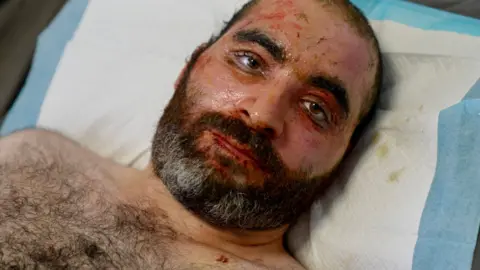 Goktay Koraltan
Goktay KoraltanWhen the air strike hit, Mohammed was handing out sizzling meals to aged neighbours – one thing he and his mates had been doing since Israel’s newest invasion of Lebanon on 1 October.
The civil engineer, 29, was standing about 5m (16ft) away from the explosion, which destroyed a home in his village in southern Lebanon.
Layers of pores and skin have been scorched from his brow and his cheeks, leaving his face uncooked and pink. His fingers have been charred. His stomach has third-degree burns. Two weeks on he radiates ache, and trauma, however desires to inform his story.
“It was all black, smoke in all places,” he says in a low voice. “It took a few minute. Then I began to recognise what’s round me. I observed my two mates have been nonetheless alive however bleeding so much. It took about 5 minutes for the folks to get us out.”
Mohammed recounts the horrors from his mattress within the Nabih Berri authorities hospital, which is perched on a hilltop in Nabatieh. It is among the greatest cities within the south, and simply 11km (seven miles) from the border with Israel, because the crow flies. Earlier than the battle it was residence to about 80,000 folks.
Mohammed says there was no warning earlier than the strike – “by no means, to not us, to not our neighbours, to not the individual inside the home that was hit.”
That individual was a policeman, he says, who was killed within the assault.
“We’re not army,” he says, “we aren’t terrorists. Why are we being hit? The areas which are being hit are all civilian areas.”
Mohammed will return residence to his village, Arab Salim, when he’s discharged, although it stays underneath fireplace. “I haven’t got wherever else to go,” he says. “If I may [leave] I might. There is not any place.”
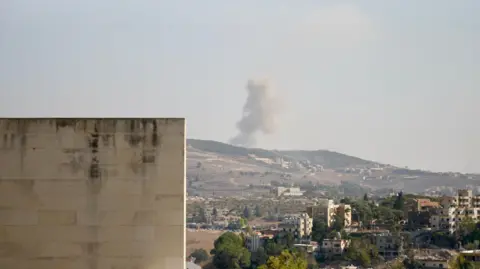 Goktay Koraltan
Goktay KoraltanAs we tour the hospital, one other air strike sends employees dashing to a balcony, to examine what has been hit this time. The hospital gives a panoramic view of gray smoke billowing from excessive floor about 4km away.
Shortly afterwards, a couple of flooring down within the emergency room, the wail of a siren warns of casualties arriving – from that air strike. It had hit Mohammed’s village, Arab Salim.
A lady is rushed in on a stretcher, with blood streaming down her face. She is adopted by her husband, who hits a wall in frustration earlier than slumping over in shock. Docs disappear behind closed doorways to look at her.
Inside minutes the hospital director, Dr Hassan Wazni, tells employees she has a ruptured artery and have to be moved to a specialised vascular centre in a hospital additional north.
“She wants it instantly,” he says, as cries of ache come from the inspecting room. “Discuss to Saida [a nearby town]. If it’s OK, let’s take her instantly, as a result of she will’t wait.”
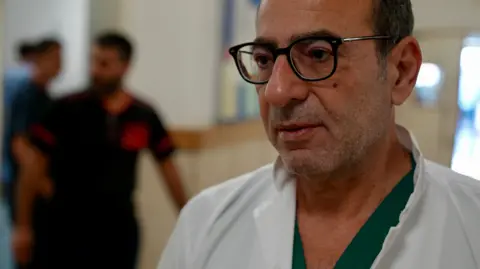 Goktay Koraltan
Goktay KoraltanThe hospital receives 20-30 casualties from Israeli air strikes a day. Most are civilians, however no-one is turned away. “We take all sufferers, and all injured, and all martyrs who come,” he says. “We do not discriminate between them.”
Dr Wazni has not left the hospital because the battle started. Behind his desk in his workplace, he opens a packet of cigarillos. “I believe it’s OK to interrupt some guidelines in a battle,” he says with an apologetic smile.
He’s struggling to pay wages and give you 1,200 litres of gas per day to run the turbines that energy the hospital. “We get nothing from the federal government,” he says. “It doesn’t have it.”
His gas is espresso, which he gives us repeatedly.
With 170 beds, Nabih Berri is the principle public hospital within the metropolis, however now has solely a skeleton employees, and 25 sufferers. The sick and the wounded introduced listed below are transferred rapidly to hospitals in safer areas additional North. Workers say there have been “many strikes “near Nabih Berri. Throughout our go to there’s damaged glass contained in the lobby.
Nabatieh has been underneath fireplace for greater than a month.
The municipality constructing was blown up two weeks in the past, killing the mayor, Ahmad Kahil, and 16 others. On the time he was having a gathering to co-ordinate help distribution. Once we cross by the ruins, bundles of flat bread stay seen on the ground of a wrecked ambulance.
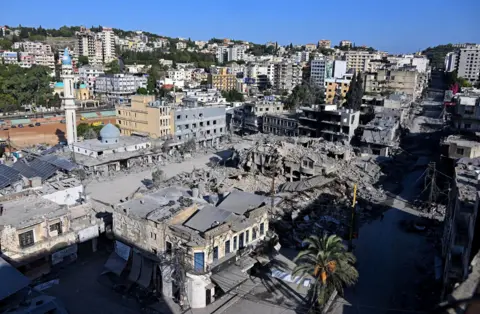 Reuters
ReutersThe large strike introduced down a number of neighbouring buildings – a metropolis block is lacking from the panorama.
Additionally lacking is an Ottoman period market – the guts of Nabatieh – which was destroyed on the identical day. Centuries of historical past have been crushed into rubble, heritage turned to mud.
The previous market, or souk, was treasured by Hussein Jaber, 30, who’s a part of the federal government’s emergency companies. He and his males, a few of them volunteers, take us there for a short go to. They drive at velocity – the one approach to journey in Nabatieh.
“We have been born and raised right here,” Hussein says, gesturing round at slabs of concrete and twisted steel. “We have now been right here since we have been youngsters. The souk means a fantastic deal to us. It’s actually unhappy to see it like this. It holds reminiscences of the previous and the gorgeous days we spent with the folks of this metropolis.”
Like Dr Wazni, Hussein and his colleagues have remained with the folks, regardless of the dangers. Greater than 110 paramedics and first responders have been killed in Israeli assaults in Lebanon previously 12 months, in keeping with Lebanese authorities figures – most of them previously month. Some assaults contain “obvious battle crimes”, in keeping with the worldwide marketing campaign group, Human Rights Watch.
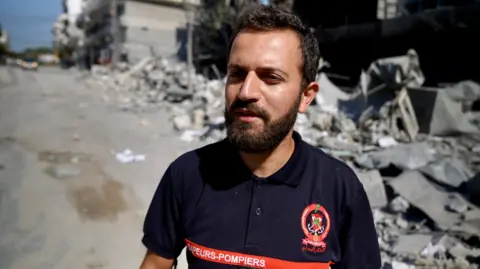 Goktay Koraltan
Goktay KoraltanHussein misplaced a colleague and a pal this month, in an air strike 50m from their civil defence station, the place they sleep with mattresses up towards the home windows. The useless man, Naji Fahes, was 50 years previous and had two youngsters.
“He was enthusiastic and robust and cherished to assist others,” Hussein tells me. “Despite the fact that he was older than us, he was the one dashing to go on missions, to be with the folks and to rescue them.”
He died, as he lived.
When the air strike occurred, Naji Fahes was standing outdoors the station, able to go on a mission.
As Hussein speaks, we have now firm. An Israeli drone circles within the skies overhead, then will get decrease and louder. The insistent buzzing of the drone competes together with his voice. “We hear it 90% of the time,” he says. “We expect it’s instantly above us now. Likely it’s watching us.”
As for Hezbollah, its presence within the metropolis is out of sight.
The Israel Defence forces (IDF) instructed us it’s “working solely towards the Hezbollah terrorist organisation, not towards the Lebanese inhabitants.”
Israel says its combat is “towards the Hezbollah terrorist organisation, embedded inside civilian inhabitants and infrastructure”.
A spokesman mentioned it “takes many measures to mitigate civilian hurt together with advance warnings”, although there was no warning for the air strike that wounded Mohammed, or the assault that killed the mayor.
In 5 and a half hours on this as soon as bustling metropolis we noticed two folks out within the open, on foot. Each rushed away, unwilling to talk. Throughout our go to a drone was broadcasting messages from the Israeli military – instructing folks to go away instantly.
It’s estimated that only some hundred stay right here unwilling or unable to maneuver elsewhere. They’re primarily the previous and the poor, and they’ll reside or die with their metropolis.
And Hussein and his crew will likely be right here, to come back to their help. “We’re like a security internet for the folks,” he says. “We are going to keep, and we’ll keep it up. We will likely be subsequent to the civilians. Nothing will cease us.”
Further reporting by Wietske Burema and Angie Mrad




